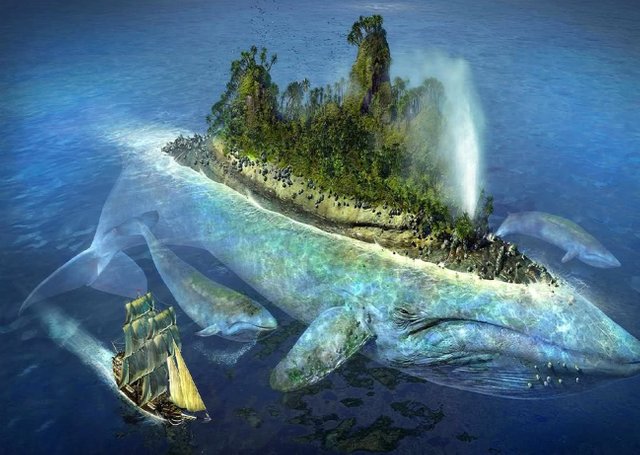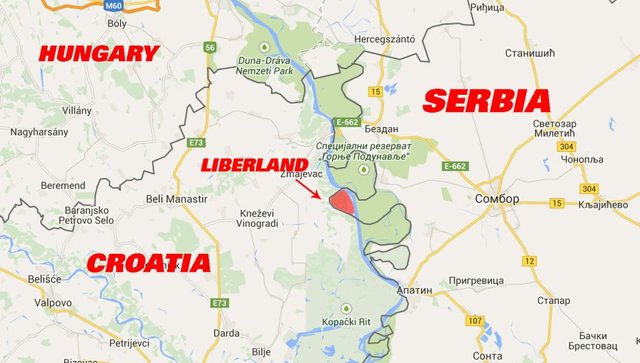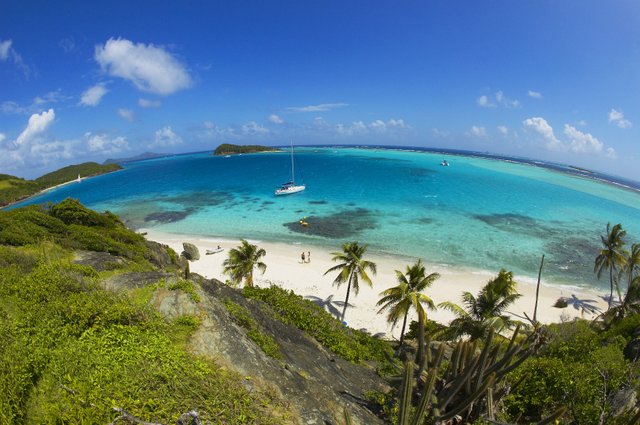Creating Liberty Island: My Perspective on Steemit

People think I’m a small whale. But I’m just a ship at sea. Guess what I’ve found?
Note: This article is dedicated to @tuck-fheman, who asked me (in a comment to one of my posts) how one legally can live beyond government control. I am a former lawyer who distrusts government, so I decided to take on the task of researching this from a certain perspective. I hope this article provides a partial answer to Tuck’s question!
And yes, I did pay @donkeypong on his recent article (at least partly so far in BTC). He can vote, but is still locked out of his wallet. He gets credit for helping me on this article, too!
Creating Liberty Island: My Perspective on Steemit
By Richard Kaplan, @steemship
Let’s say you don’t like your government very much. It’s oppressive. It tries to control everything. It has its hands everywhere, from taxes to marriage licenses to building permits. Large corporations are no better. The ultra-rich (aside from a few who truly care about a better world) are bleeding the working class dry and turning the economy into their personal ATM machine.
There’s no upward mobility anymore, no middle class, no chance to get ahead. The people who control government don’t want you to get ahead. And the people who control money don’t want to share it. All of them want to control your life.
Time to get away? Where would you go?
Option 1: Run for the hills
You can live in a typical nation and simply refuse to recognize its government. Living your life, you can do what the government tells you to do and complain about it (live under the radar). Or you can be a rebel: refuse to pay taxes, obey laws, or conform to authority. There are individuals and communities who live in dissent, but the fear of government enforcement and prosecution is always very real.
Option 2: Move to a Foreign Country with a “Hands Off” Government
The second possibility is to live in a country with a laissez-faire, do-nothing government. Some of them have low taxes and are relatively “hands off” in their approach to regulating peoples’ lives. Certain offshore money havens meet this description, and others have expressly catered to expat communities, whether these are libertarians, retirees, or artists.
These governments’ motivations for allowing people to live free are probably “money first” rather than any ideal of liberty. Maybe that isn’t a deal breaker, but when government power changes hands, what then? When the country needs something from powerful world governments, will they apply economic or political pressure that forces internal changes? In the end, this may be a better option that # 1 above, but it is not reliably secure in the long run either.

Option 3: Buy or Claim an Island or Disputed Area
Third, you can buy an island or assert rights over one, but there aren’t many islands in the world that are outside the territorial jurisdiction of a government. Fishing rights and offshore oil and gas rights are so valuable that we have seen multiple countries sparring over some bleak rocks in the middle of an ocean. The Spratly Islands in the South China Sea, for example, have islands and rocks and waters that are claimed by China, Taiwan, Vietnam, the Philippines, Malaysia, and Brunei. There are many other examples of disputed islands and other lands around the world.
In 1971, a Libertarian millionaire named Michael Oliver led a group to claim land in the Minerva Reefs in the South Pacific. He and his group (later called the Phoenix Foundation) tried to erect a platform on a reef that normally sat one meter (three feet) under water at high tide. They hired barges to carry sand in from Australia, attempting to create permanent dry land for their Republic of Minerva. They published a Declaration of Independence, elected a president, and created their own currency.
Other countries in the region were not happy. Australia, New Zealand, Fiji, Tonga, Nauru, Samoa, and the Cook Islands territory held a conference. They urged Tonga (the nearest country) to submit a claim of sovereignty over the Minerva Reefs, which Tonga did. Tonga’s claim was recognized by the other nations of the region. The Republic of Minerva project collapsed. Oliver’s Phoenix Foundation later made other attempts on Abaco Island in the Bahamas and in Vanuatu.
There are other examples of people claiming open or contested territory in order to establish a country. In 2015, a Czech activist named Vit Jedlicka founded the micronation of Liberland. Liberland has an ongoing claim to a parcel of land on the banks of the Danube River on the disputed border between Croatia and Serbia. This is a fascinating experiment, because there is a solid historical argument that neither of the neighboring countries owns this land. But because Croatia exercises some control over it, the Croatian police have stopped and detained the Liberland founder and anyone else who attempts to land a boat on the parcel of land.
There have been some other attempts to claim land for these purposes as well. All of them generally rub up against countries that are larger and have the military capability to enforce their will.
Option 4: Taking over an existing country with a nonviolent coup and instituting your own government (or lack of one) there
There are many advantages to taking over an existing country and building one’s vision there. In terms of international law, most coups and changes of government are tolerated, even if large powers are not too happy about. Governments change all the time.
A country that changes its government (by election or by coup) still retains most of what it has achieved in the international community. This might include UN membership, domestic banks that participate in the international monetary system, and trade agreements with other countries. You can slam any of these as being incompatible with your own world view, but some of these features provide benefits to the country’s private sector as well as whichever government it has (even if it has none).
If you were starting a government or even some non-government cooperative from scratch, it would take decades to build up these kinds of agreements and benefits. The country’s functional economy may depend very heavily on loan guarantees and stable trade agreements with foreign partners. Over time, you could change these if you wanted, but by taking over a country that already has established such links, your work would be much, much easier than if you had just planted a flag on an uninhabited rock in the middle of the ocean.
If you plan to stage any coups, I would never advocate a violent one. Some countries are small enough that you might be able to charter a cruise ship and fill it with nonviolent soldiers, land it there, and take over the place in a matter of hours. Get on the TV and Internet there, promise the people they are “free to do as they damn well please” (to quote the former president of the Republic of Minerva), and maybe you’ll force enough of a crisis that the old government gives up.
But the problem here is the same as with Option 3. Stronger governments take an interest. And they have militaries to enforce their will.
Case in point: Bob Denard, a French foreign agent and mercenary who sometimes acted in France’s interests and sometimes in his own. Denard, also known under his aliases of Gilbert Bourgeaud and Said Mustapha Mahdjoub, was responsible for four separate coup attempts in the Comoros Islands (the Comoros is a sovereign country on an island chain in the Indian Ocean off the East Coast of Africa). He staged one of the coup attempts using inflatable boats and launched another from the back of a bicycle.
Denard was an interesting character. He was born a Catholic, then converted to Judaism, then to Islam, and back to Catholicism again. He was polygamously married seven times. Besides staging four coup attempts in the Comoros, Denard participated in many more rebellions, civil wars, coup attempts, plots, and assassination attempts in Morocco, Rhodesia, Yemen, Iran, Nigeria, Benin, Gabon, Angola, and Zaire. He also was convicted of an assassination plot against a French politician.
As colorful as Denard was, he also provides a good cautionary tale about staging a coup in one’s own interests. His fourth coup attempt in the Comoros, in 1995, was somewhat successful until the French government turned against him. The following text is taken from Wikipedia’s entry for Operation Kaskari, which was Bob Denard’s name for the fourth coup attempt:
Denard and 33 hand-picked mercenaries docked their ship, Vulcain, at Moroni harbour and descended on the city, forcibly removing the figures of the official government before the ill-equipped army was aware. The invaders had been stowing away on Vulcain for more than a month, and were greeted at their arrival by vans supplied by the relatives of former president Ahmed Abdallah.
The French authorities had some advance notice of the coup, as they had before. But unlike Denard's previous coups, the French government opposed the mercenaries and denounced Denard. Knowing this, Denard's first priority was to prevent the likely counter-coup from his homeland. In addition to political pacification measures, such as forming a civilian government, Denard also tried to recreate the 500-strong presidential guard that he had led after his second coup (1978–1989). Denard's popularity during the early 1980s enabled him to mobilise 300 supporters within five days and place them around ports and airports, where they would be most effective to ambush French invaders with submachine guns.
France had advance knowledge of the coup, but refrained from preventative measures until after it had occurred. As news of the coup came, the French government denounced Denard and his mercenaries. Knowing what they would encounter on the islands, the French did not pursue their extreme numerical advantage, instead handing control to the Special Operations Command. Eventually, 400 marines and 200 other special operations experts began cruising the Indian Ocean in patrol boats and a frigate, with superior logisticians and helicopters in tow.
The specialists encircled (his) barracks in the early hours of the 5th of October, and Denard was arrested and flown to a Parisian jail.

Lesson: As with the Republic of Minerva and Liberland examples, powerful countries do not take kindly to their interests being threatened. Their interests apparently include minor rocks in the ocean or swampland that no one pays much attention to at other times. Sooner or later, they will assert their control. As long as they have a near-monopoly on force through their military and police, this will be the case.
Option 5: Colonize Outer Space
Hmmm. We’re not quite there yet.
Option 6: Move Much of Your Activity Beyond Their Reach
Aha! What do I see ahead? My Steemship is nearing an island. Oh my goodness, look at that spout of steem! Are those whales underneath, holding it up?
Not for long, the way that island is growing. It’s called Steemit. And they say that in time, the whales will continue their journey. This island will be floating on its own power in no time!
The last possibility is to go on living as you normally would (or try one of the other options above), but also move as much of your activity as possible to a space that is beyond government control.
This is the Island of Liberty that Dan and Ned have created with Steemit. It’s a virtual island. Once the world of Steem is fully functioning, there will be virtual marketplaces and exchanges that ensure you can get most of what you need without ever having to use fiat currency or support governments.
Some people wonder why there are so many different currency tokens in Steemit. Why doesn’t Steemit use real dollars instead of Steem Dollars? Why have Steem Dollars AND Steem? What is Steem Power good for?
If you need to understand these currencies better, I strongly recommend the following article by @donkeypong since it has a good explanation. The Steemit 101 e-book that’s on Amazon (which I co-wrote) has a good overview of the currencies also. https://steemit.com/steemit/@donkeypong/still-confused-by-steem-steem-dollars-and-steem-power-the-power-plant-analogy
Steem Power is like preferred stock that vests, like a Certificate of Deposit, or like a savings account. It produces a higher yield than STEEM, meant to combat inflation. Steem Dollars are something like a savings account also in that holding them entitles you to the equivalent of 10% interest. They double as a relatively price stable currency in which everyone is paid (at least partly, since the rest is in Steem Power). And Steem is the most liquid of them all with the benefits and volatility of a cryptocurrency.
When you transfer and exchange out of Steem or Steem Dollars, you are leaving the island.
Here, my point is that these currencies put Steem’s entire economic system beyond the reach of many governments. It’s all one ecosystem, and from one perspective, if you never cash out your Steem currency tokens into fiat currency (such as U.S. Dollars), then perhaps you will not need to declare it or pay taxes on it. Don’t take my word on that; research the laws of your country or jurisdiction. But there has been some history of tolerance towards online gaming ecosystems and their tokens.
Laws can always change. They can be extended to cover new technologies. Countries can step up enforcement beyond the limits of their laws. And they can act arbitrarily and capriciously. But the stronger the island, the better its chances.
What a grand experiment! Steemit Island is a pretty good place to be. It’s as free and as safe as anything, and the more people who find it, the more it can establish itself as a bastion of freedom.
I think I’ll sail my ship around the cape there and head for this friendly harbor. Let me tie up for a while and help these people build their island. The view from the hill on top is extraordinary.
-Peace, Richard, @steemship

References:
NYT obituary on Bob Denard: http://www.nytimes.com/2007/10/16/world/europe/16denard.html?_r=0
Wikipedia on Phoenix Foundation: https://en.wikipedia.org/wiki/Phoenix_Foundation
Wikipedia on Operation Azalee (Kaskari), source of long quote above): https://en.wikipedia.org/wiki/Operation_Azalee
Denard’s 1995 coup attempt: http://www.mercenary-wars.net/comoros/denard-1995.html
US News & World Report re: Liberland: http://www.usnews.com/news/business/articles/2015/05/09/microstate-tax-haven-in-the-balkans-not-that-easy
Wikipedia on Liberland: https://en.wikipedia.org/wiki/Liberland
Splendid! I never saw this revolutionary platform from this perspective. More reasons to believe that all efforts put into Steemit will be multiplied exponentially in the future.
A great read. Best thing I've read today. Besides, you're still a small whale. One with a ship. ;)
Obligatory personal note: @tuck-fheman is a legend. LOL.
Best thing ive read all week. Easily.
Looks pretty great and all, but the last part of the story kind of loses its reach.
How is Steemit going to help me or keep me safe when the government in country X wants to lock me up? Untill I can upload myself to the blockchain, I fear this is not a solution, but rather, a circlejerk of those who like Steemit.
Similar to SP, SMD tokens cannot be purchased directly on an external exchange. SMD are primarily earned through contributing but can be purchased by converting STEEM tokens to SMD tokens.
Actually Steem Dollars can now purchased on external exchanges !
https://poloniex.com/exchange#btc_sbd
https://bittrex.com/Market/Index?MarketName=BTC-SBD
PS Abbreviation of SBD = Steem Backed Dollars
or just SD = Steem Dollars (not SMD please edit)
Hey steemship I love your whale photo. I think you missed one very important option. Option 7 - Own your mind. Create from your desire and live a free life, anywhere.
https://steemit.com/liberty/@marco555/the-imminent-tax-on-crypto-thoughts-evidence-and-opinions
I love reading about these things, even though I'm not much of a revolutionary myself. Have fun storming the castle! :)
If you like what I say, check out my series on game theory.
Your articles are terrific. Sorry I missed the chance to vote on those. I will look for more from you in the future.
No worries! My timing was bad with Part 4 - I posted it right when a bunch of whales were locked out of their accounts. I'll holler at you when the next ones go up!
I agree. I loved the part 3 post.
For those curious, Step 6 is known as Agorism in the anarchy community. So if you see that term, you know what they're talking about!
I would like to advise you, at the beginning of the article, to make a paragraph with short content, you can attract more people. It is difficult to read. Also how difficult is it to read my messages ;)
Remember to upvote others you fine whale you.
This are stories what should earn the 20k - not that crap what your whale collegues (in my eyes you are one too) are upvoting... lol. It was one of the best things I have ever read here on Steemit.
As you are (what I would call) a whale, may I ask you for some feedback or statement on the actual upcoming spam topic and editorial work? I wrote an article today and need some statement from "valueable" voters (aka whales) on that topic.
https://steemit.com/money/@hastla/why-whales-and-dolphins-have-to-start-work-for-steemit-or-lose-their-whole-investment
The problem with their "reach" is that they control the cryptocurrency chokepoints (conversion to fiat in exchanges / bank wires, etc). This is still a problem and might get worse in the future.